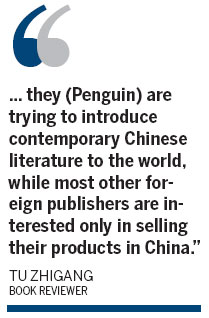Life and Leisure
You can't please all the critics all the time
By Mei Jia and Chitralekha Basu (China Daily)
Updated: 2010-10-08 08:04
 |
Large Medium Small |
While most critics and industry-watchers agree that Penguin has made a good start promoting Chinese literature to the world, others feel the company still has a long way to go before it gets a firm grip on the Chinese reader's pulse.
Tu Zhigang, a veteran reviewer of books, says the company needs to get in touch with "the core of contemporary China".
While he doesn't mind acknowledging Penguin's well-intended drive toward "doing books that represent the vigor and trends in contemporary Chinese writing", Tu feels the multinational publishing house "hasn't yet grasped the overall situation and context of contemporary Chinese literature". Its interest, so far, is limited only to "the so-called best-sellers and popular books", he says.
He hastens to add that Penguin's inability to get a feel of Chinese literary sensibilities may just be an extension of the Western world's limitations in understanding China.

"It could be that contemporary Chinese literature does not appeal to an English-speaking audience," he says.
The culture gap is also apparent in Penguin's partnerships with Chinese publishers, which are not always smooth sailing.
"We differ with them in certain aspects, mainly because of cultural differences between us," says Chen Jianjun, general manager of Alpha Books Company, which worked with Penguin recently.
"Once they reach a decision they are quite resolute about it, which we may disagree with but respect."
Zhang Xiaoqiang, researcher of Russian literature at the Chinese Academy of Social Sciences, feels Penguin's approach to dealing with the copyrights of Chinese authors is hardly exemplary.
However, both Zhang and Chen agree the company has a good team and a well-defined vision, which will probably take them a long way.
"Penguin in China has hired some really capable, hardworking, knowledgeable people," Zhang says. "The effort is apparent."
"Penguin excels in promoting cultural exchanges between China and the United Kingdom, and in developing a pool of talented translators," Chen remarks. "It has a clear strategic plan in China, which works efficiently."
What sets Penguin apart from the rest of the competition in China is that "they are trying to introduce contemporary Chinese literature to the world, while most other foreign publishers are interested only in selling their products in China", Tu says.
It's just that their appeal is still limited to a niche market rather than a wider reading public, he feels.
China Daily
(China Daily 10/08/2010 page19)